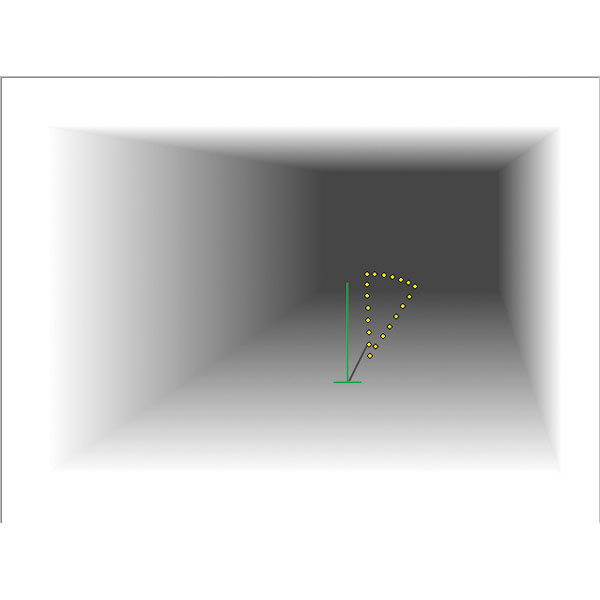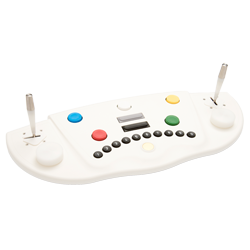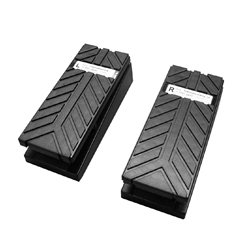
Assesses the coordination of eye-hand, hand-hand, or eyehand-foot by maneuvering a circular segment that moves on its own about a 3-dimensional room.
An impressive test with a striking elegance and sophistication in pretending 3 dimensions. The joystick helps to assess the sensomotor coordination precisely.
The assumption is that movements are controlled through the use of sensor information coming from current activities. Occurring deviations between target value and actual value are revealed and corrected accordingly (the TOTE principle). The necessary time to coordinate one's movements is essentially determined by the received and processed feedback information. Two completely separate constructs are assessed: the "Anticipative coordination ability" refers to sensomotor coordination necessary to maneuver an element to a pre- set goal (target is known beforehand). The "Reactive coordination ability" refers to sensomotor coordination necessary to react adequately to an element's spontaneous, unpredictable changes of direction (and size) (ability to anticipate movements).
The element selected for this test is a geometrical shape (circular segment) that is easy to describe and is hardly influenced by any previous experiences.
The screen depicts a room with a target position (green bars forming an upside-down "T") and a maneuverable element (yellow circular segment). The circular segment starts moving about the room in unpredictable directions (that remain the same for all respondents). All test forms include a preceding instruction and practice phase.
The following seven variables are assessed: "Time in ideal range", Mean and distribution of "Angle deviation", "Horizontal deviation", and "Vertical deviation".
The internal consistency is situated above r=.90 in all scales.
The results of statistical correlation analyses and inter-group comparisons (including other tests and various external criteria) back up the convergent and discriminant validity of the SMK. Extensive aviation psychological validations (pilot selection) have been conducted with the Austrian Federal Army.
Test forms S1-S3 are provided with age- and education-specific samples (N=239). Test form S4 can be compared to age-, gender-, and education- specific samples (N=189).
Instruction: about 5 minutes.
The Schuhfried VTS enables computer-assisted application of a large number of highly diverse psycho-diagnostic tests and measuring procedures. In developing the system much emphasis was placed on transparent structure and largely uniform design. It is therefore simple to operate and easy to understand and does not require any special computer skills.
The VTS basic module is required for administration of any of the available tests.
The Schuhfried VTS supports the administration of both single tests and test batteries. Many of the single tests are available in different test versions. These test versions may differ, for example, in terms of test duration or difficulty or may be parallel forms. They are characterized by different parameters reflecting specific test requirements. They have been designed for administration to a specific population (e.g. psychiatric patients, children, etc.) or for special measuring purposes (e.g. repeated measurements). Test batteries are compiled from the available single tests and test versions.
The universal panel allows for user-friendly data input and can be used for many different tests. The test selected determines if the panel is needed. Consult the test's description to see if this panel is required.
The Schuhfried VTS enables computer-assisted application of a large number of highly diverse psycho-diagnostic tests and measuring procedures. In developing the system much emphasis was placed on transparent structure and largely uniform design. It is therefore simple to operate and easy to understand and does not require any special computer skills. This VTS basic module is required for administration of any of the available tests.
Large left and right analog foot pedals for use with specific tests requiring foot control. These foot pedals are used with the Universal Response Panel, model 64025. These analog foot pedals are an optional control input for specific tests, such as the Model 64055 SensoMotor Coordination Test.

